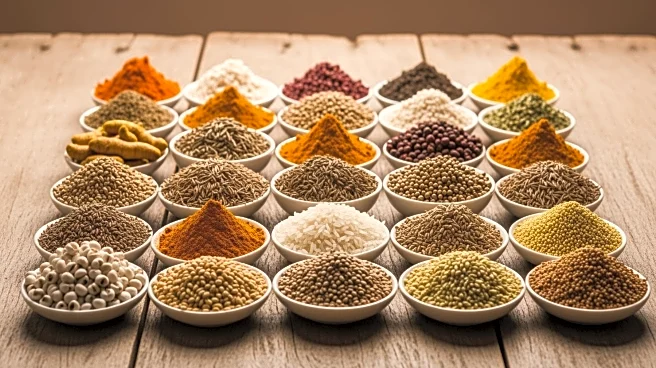What's Happening?
Indian agriculture is increasingly being used as a strategic instrument of foreign policy, driven by geopolitical conflicts, climate change, and supply chain vulnerabilities. Historically focused on domestic food self-sufficiency, India is now leveraging
its agricultural surplus to forge alliances and secure trade benefits. During the 2022 wheat crisis, India made exceptions to its export ban for friendly nations, providing wheat to Egypt and Afghanistan. This 'food diplomacy' strengthens diplomatic ties and enhances India's image as a responsible global actor. Additionally, India is forming strategic agricultural partnerships, such as the India-Middle East Food Corridor and the India-UAE food security partnership, to diversify risks and secure supply chains.
Why It's Important?
The strategic use of agriculture in foreign policy has significant implications for India's global standing and economic growth. By providing food aid and forming agricultural partnerships, India is able to strengthen diplomatic relations and secure trade benefits, which can lead to increased economic stability and growth. The India-UAE partnership, for example, involves a $2 billion investment to establish food parks in India, enhancing food security and agricultural exports. This approach not only addresses immediate food security concerns but also positions India as a leader in sustainable agricultural practices, particularly with the promotion of millets following the UN's declaration of 2023 as the International Year of Millets.
What's Next?
To fully harness its agricultural economy as a tool of foreign policy, India needs to adopt a more proactive and stable strategy. This involves investing in value-addition, market access, and diversified exports, as well as enhancing infrastructure and securing input supplies. Consistent policies that balance domestic needs with international reliability are essential for India to maintain its position as a robust and respected global actor. By focusing on these areas, India can transition its agricultural foreign policy from reactive to strategic, ensuring long-term impact and consistency in its geopolitical ambitions.
Beyond the Headlines
India's strategic use of agriculture in foreign policy highlights the potential for agriculture to serve as a tool for geopolitical influence. By leveraging its agricultural strength, India can address global food gaps and enhance its development partnerships, particularly with African nations. The strategic location of India, with access to vital markets through the Indian Ocean and Central Asia, further enhances its ability to use agriculture as a means of advancing its geopolitical and economic ambitions.
















